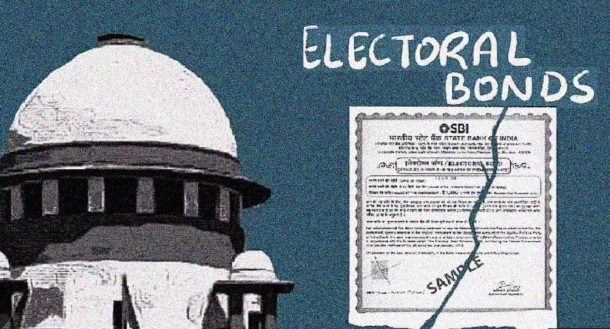Context:
Recently, the Constitution Bench of the Supreme Court (SC) has ruled unanimously that the Electoral Bond Scheme for political funding is unconstitutional.
Key highlights of the judgment:
Various grounds on which SC declared unconstitutional:
- The anonymity surrounding electoral bonds undermines voters’ and citizens’ right to information and transparency in political funding as enshrined in Article 19(a) of the Constitution.
- Access to information on political party funding is crucial for voters to make informed decisions in a democratic system.
- Electoral bonds do not pass the strict means test of the doctrine of proportionality, as alternative methods exist to combat black money.
About the Electoral Bond Scheme:
- The electoral bond scheme was introduced during the Union Budget for the fiscal year 2017-18 to reform the political funding system in India.
- Amendments made through the Finance Act of 2017 modified various legislations, including the Reserve Bank of India Act 1934, Representation of Peoples Act 1951, Income Tax Act 1961, and Companies Act, to incorporate the electoral bond mechanism.
Amendments to the Companies Act, 2013 declared unconstitutional:
- Previously, companies operating at a loss were prohibited from making political contributions.
- However, amendments have opened the door for even loss-making companies to donate, potentially enabling shell companies to engage in quid-pro-quo (reciprocal exchange) towards political donations.
- In contrast to individual contributions, corporate political donations are viewed as straightforward business transactions.
Some key observations:
- The State Bank of India (SBI), which is responsible for issuing electoral bonds, will cease the issuance of these bonds.
- SBI will provide information on donations made through electoral bonds, including the identities of donors, recipient political parties, and the amounts involved.
- The Election Commission of India (ECI) will then publish this information on its website.
Government’s arguments:
- Restrictions on the use of cash in political funding have been implemented to address the prior practice of substantial cash donations made through dubious means, maintaining the donors’ anonymity.
- This opaque system allowed for massive undisclosed contributions. Measures have been taken to curb black money, including accepting payments for electoral bonds only through methods like demand drafts, cheques, Electronic Clearing System, or direct debit from buyers’ accounts.
- Compliance with Know Your Customer (KYC) requirements is mandatory for bond buyers and recipient political parties must disclose and account for the funds received.
- The time limit on bond validity prevents them from turning into an alternative currency. The anonymity of donors is a key aspect of the scheme, shielding them from potential political victimization.
- The scheme includes safeguards, permitting donations through bonds from domestic companies with a majority stake, contingent on adherence to KYC norms and FEMA guidelines.
Arguments against the Electoral Bonds Scheme:
Section 29C of the Representation of the People Act, 1951, outlines the rules for declaring funding sources for political parties, but an amendment in the Finance Act (2017) has excluded electoral bonds from this section.
- Consequently, political parties are not obligated to submit records of electoral bonds to the Election Commission for examination.
Although political parties are required to submit annual income tax returns under Section 13A of the Income Tax Act, 1961, electoral bonds have been exempted from this provision, eliminating the need to maintain records of donors’ names and addresses.
The removal of the 7.5% cap on the net profits of the last three years for companies has led to a significant increase in corporate funding.
- This absence of a limit allows companies, including those operating at a loss, to make unrestricted donations, potentially leading to the creation of entities solely for channeling funds to political parties through opaque instruments like electoral bonds.
The involvement of the State Bank of India (SBI) raises concerns of favoritism toward the ruling party.
- For example, data obtained through the Right to Information (RTI) revealed that SBI issued a substantial Rs. 1,716 crore in electoral bonds within just two months of 2019, with the ruling party receiving 94.6% of all electoral bonds sold in 2017-18.
Election Commission’s view:
The current system restricts the Election Commission of India (ECI) from overseeing violations of provisions in the Representation of the People Act.
- This limitation arises because any donations received by a political party through electoral bonds are excluded from reporting within the Contribution Report framework.
• For instance, the Representation of the People Act, of 1951, prohibits political parties from accepting donations from government companies, but this restriction does not apply to donations received through electoral bonds.
• Furthermore, the recent amendment to the Foreign Contribution Regulation Act (FCRA) permits political parties to accept funding from foreign companies holding a majority stake in Indian companies.

